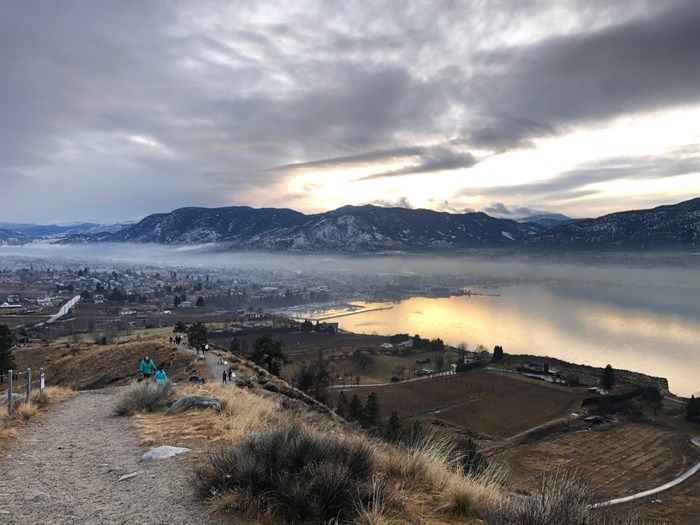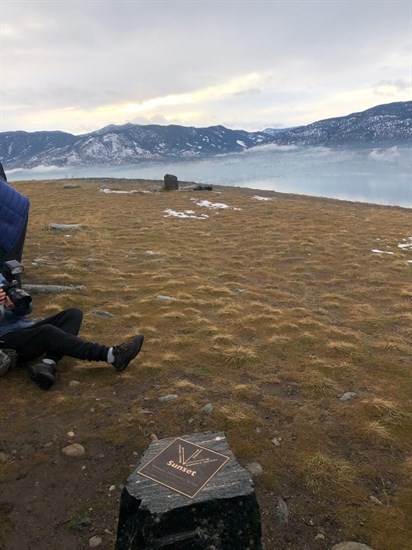
View of the 2019 winter solstice event from the top of Munson Mountain
Image Credit: SUBMITTED/Sally Kilburg
December 20, 2023 - 6:00 PM
The official start of winter tomorrow will be marked by the winter solstice, an event that many people around the globe celebrate including those who will go up to Pen Henge to see the sun set behind its winter solstice stone.
On Dec. 21, people will gather at the top of Munson Mountain in Penticton where the Pen Henge was created with four stones that were placed based on calculations of where the sun sets.
“Every year, without fail it astounds people, but the sun will set exactly as it should over the southern winter solstice stone at about 3:27 p.m.,” Sally Kilburg of the Royal Astronomical Society of Canada - Okanagan Centre says.
“At the top of Munson mountain in Penticton, we put up an array of stones up there, and if you stand at the heel stone and look towards the middle stone, that's where the sun sets at the equinox every year and the stone that is the furthest to the south is the winter solstice marker and the stone that is the furthest to the north is the summer solstice marker.”
The project to place the stones was spearheaded by Chris Purton with the local astronomical society.
The idea was not to reproduce England's famous Stonehenge, but rather to remind humans that they are part of something huge.

The Heelstone points to the southern winter solstice stone.
Image Credit: SUBMITTED/Sally Killburg
“We weren't necessarily trying to reproduce Stonehenge, even though we call ourselves Pen Henge, but we did want to bring awareness to the fact that we live on a planet in the solar system and all these things are happening that are much larger than us and here's some solid indication of how these things work,” Kilburg says.
While the skies might be cloudy tomorrow, the event will still take place and about 35 people, from astronomers to musicians, are expected to attend and all are welcome.
“(Chris Purton) will give us a small talk on the importance of the solstice and what it means culturally and astronomically,” Kilburg says. “The winter solstice is the time when the night is the longest in the north and the days are the shortest.
"Over the years that has meant a lot of things to many different people. Even ancient humans kept track of this and some people will say ‘well from this day on things are going to get better, the sun is coming back.’ It has become a time and a night of celebration at the idea that there's going to be a rebirth of events and warmth.”
The Royal Astronomical Society of Canada - Okanagan Centre is a local branch that strives to educate people about astronomy and support astronomical research. It is made up of enthusiasts, amateurs, educators and professionals.
For more information check out the society’s website here.
To contact a reporter for this story, email Gabrielle Adams or call (438) 830-1211 or email the editor. You can also submit photos, videos or news tips to the newsroom and be entered to win a monthly prize draw.
We welcome your comments and opinions on our stories but play nice. We won't censor or delete comments unless they contain off-topic statements or links, unnecessary vulgarity, false facts, spam or obviously fake profiles. If you have any concerns about what you see in comments, email the editor in the link above. SUBSCRIBE to our awesome newsletter here.
News from © iNFOnews, 2023